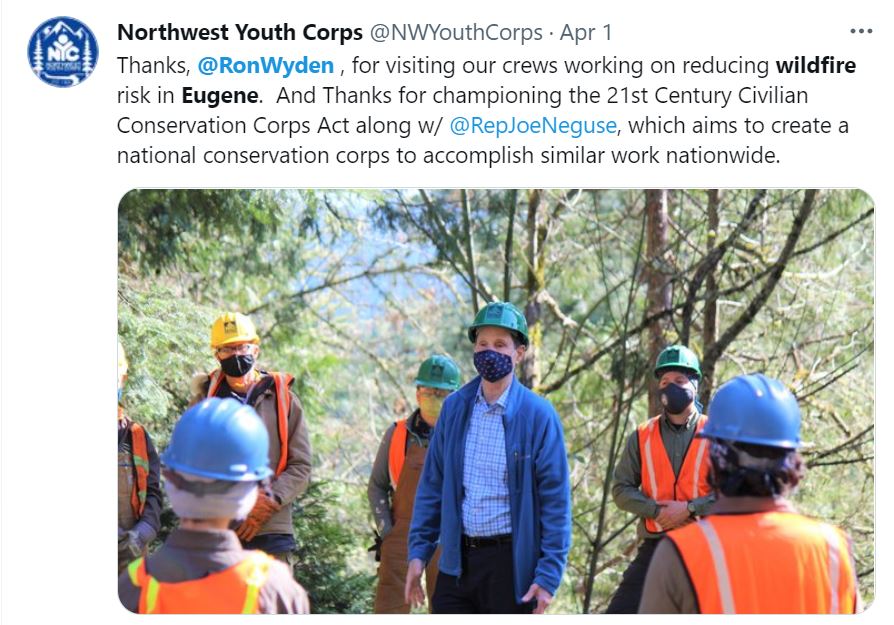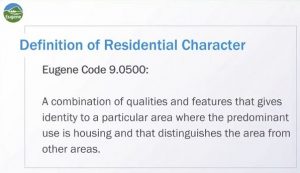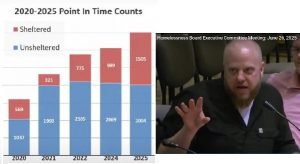Sen. Ron Wyden to USFS: Are we ready to battle simultaneous megafires?
4 min read
Sen. Wyden, who visited the Northwest Youth Corps in South Eugene earlier this year, is asking if the Forest Service can handle multiple megafires in the West.
Sen. Ron Wyden: I think what we’re dealing with is a threat that’s very different from what we’ve seen in my lifetime, and I’ve been through a few of these fire seasons.
With a record-setting heat wave in the West, Senator Ron Wyden wants to know: Is the Forest Service ready?
Sen. Ron Wyden: [00:00:17] For several weeks, I have been working very closely with the White House and the Forest Service to make sure that they are prepared to deal with an unprecedented fire season to the west, specifically, the danger of multiple big fires— infernos taking place— simultaneously— across the Western states. And these fires are going to stretch local, state, and federal resources to the breaking point, unless we are prepared. Millions of Westerners this morning are collectively holding their breath about the prospect of one of these infernos ripping through their town.
John Q: [00:01:12] He wants to know: Can our system handle multiple big fires?
Thank you for supporting
local citizen journalism
Sen. Ron Wyden: [00:01:16] Usually we’d have one big fire and other Western states would chip in for the state that was hit the hardest. So if Oregon had a big fire, Nevada, Idaho, California would all help. Now as I have been focused on with the administration and the Forest Service, we’re talking about something that’s unprecedented, which is big fires simultaneously throughout the west.
And at our recent hearing before the Energy Committee, Vicki Christiansen, the head of the Forest Service, said that she felt that very often resources are already at the breaking point. So what we’re going to hear about this week is making sure that there are personnel available to fight multiple fires at the same time; there’s equipment to back that up, that always means tankers and technology and the like; and that local, state, and federal firefighters are going to be tightly coordinated, tightly coordinated in order to deal with this very grave threat.
John Q: [00:02:33] Citizens can help too.
Sen. Ron Wyden: [00:02:35] Oregonians could be citizen watchdogs, citizen watchdogs, to help us prevent these infernos by making sure they report as quickly as they see evidence of a problem to local forestry and public health officials.
Folks that are out in the community when they see any signs, for example, of dropped matches, or people near hazardous fuels, burns in their neighborhood, these kinds of things. The really important thing for people to do is not take but a minute in calling the local fire officials, the local forest forestry folks and the public health people they have been posting their numbers, running public service information all over social media, all over the news media.
But what the public can say is, ‘We can be the watchdog over some of these threats.’ When we see somebody dropping a match, or we see some buddy burning or engaging in a practice that could set off one of these great big fires, local government has set up a good contacts and good phone numbers and accessible ways to weigh in and let people know.
John Q: [00:03:53] Twenty billion dollars, Senator Wyden estimated, it will cost to clean up the mess.
Sen. Ron Wyden: [00:03:59] I asked Vicki Christiansen, head of the (U. S.) Forest Service about what it would take to get out in front of the hazardous fuels buildup problem. These hazardous fuels are very dry materials that accumulate on the forest floor. There’s a match, there’s a lightning strike, all of a sudden there’s an inferno. And there are millions and millions of acres that need to be thinned. I went through the math that I thought described the resources necessary to deal with this hazardous fuels backlog. And it’s $20 billion to get out in front of the backlog, according to my math, and Vicki Christiansen confirmed it.
John Q: [00:04:42] His proposed 21st Century CCC could be helping right now, he said.
Sen. Ron Wyden: [00:04:47] The hazardous fuels issue is both a short-term and a long-term, uh, issue. There are other efforts that are part of what I’m doing. I proposed a 21st century Civilian Conservation Corps Act. Now, if that had been law right now, when there was a big fire, those members of the Corps could help homeowners and businesses reduce fire risk. I think it would be very helpful.
I’m pushing hard for my National Prescribed Fire Act. That’s something you use during the cooler wetter months so you don’t have as many threats in these dangerous seasons, like right now, and also a Disaster Safe Power Grid Act so that power companies are working to reduce the risks of wildfire.
John Q: [00:05:35] The senator gave a shout-out to volunteers and firefighters.
Sen. Ron Wyden: [00:05:40] I want to just make sure I give two big thank-you’s before I go, first to all the volunteers across Oregon, working, pitching in, helping, families, all wanting to make sure that we do everything we can to keep Oregonians safe during the historic heat wave.
And then I want to give a big shout-out to all our firefighters, all the people who are willing every week to put their lives at risk in order to secure ours. And I met a lot of them last few weeks as I’ve gotten around the state and particularly rural areas. And folks hear me talk a lot about The Oregon Way, which is how we all pitch in, we all help, it’s not about politics. These firefighters—these incredibly courageous firefighters—they’re Exhibit A when we talk about The Oregon Way. And I think all Oregonians ought to give a special shout-out, and special thanks, to these firefighters, ’cause they make us really proud and they’re practicing The Oregon Way every day.
John Q: [00:06:47] On Wednesday, Western governors will meet with the president at the White House to discuss the threat.



